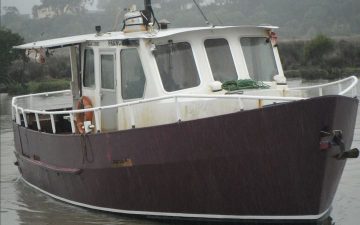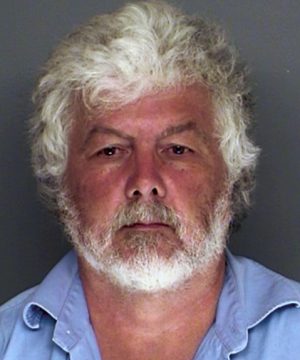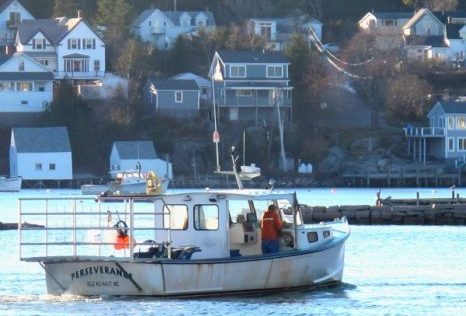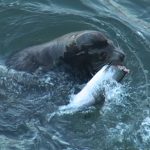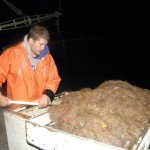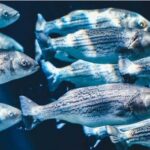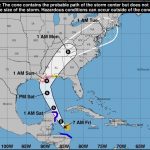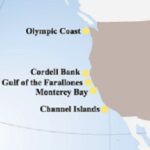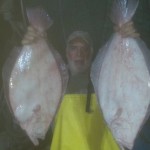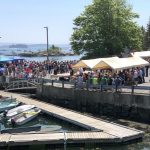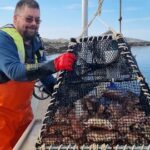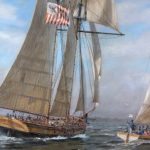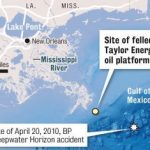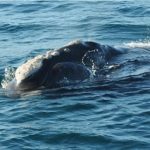Monthly Archives: November 2016
Two N.H. Fish and Game officers presented with Life Saving Award
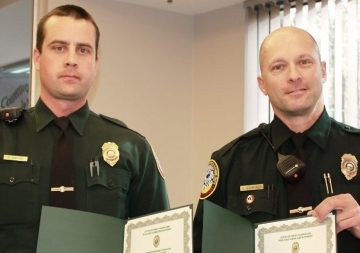 Two New Hampshire Fish and Game officers were presented with the Fish and Game’s Life Saving Award for their courageous actions rescuing two fishermen from a burning lobster boat in June. “On behalf of the citizens of the state of New Hampshire and the New Hampshire Fish and Game Department, we extend our sincere gratitude to these officers for their professionalism and exemplary performance under extreme circumstances. Thanks to their quick thinking and brave actions, two New Hampshire fisherman survived a life-threatening event,” said Fish and Game Law Enforcement Chief Kevin Jordan. On June 19, conservation officers Dale Gargac and Graham Courtney were patrolling the coast when they observed a boat on fire off the coast of Rye, officials said. When they arrived on scene, Gargac and Courtney found two fishermen in the water, suffering from the early stages of hypothermia while clinging to the stern of the burning boat, officers said. Read the story here 17:11
Two New Hampshire Fish and Game officers were presented with the Fish and Game’s Life Saving Award for their courageous actions rescuing two fishermen from a burning lobster boat in June. “On behalf of the citizens of the state of New Hampshire and the New Hampshire Fish and Game Department, we extend our sincere gratitude to these officers for their professionalism and exemplary performance under extreme circumstances. Thanks to their quick thinking and brave actions, two New Hampshire fisherman survived a life-threatening event,” said Fish and Game Law Enforcement Chief Kevin Jordan. On June 19, conservation officers Dale Gargac and Graham Courtney were patrolling the coast when they observed a boat on fire off the coast of Rye, officials said. When they arrived on scene, Gargac and Courtney found two fishermen in the water, suffering from the early stages of hypothermia while clinging to the stern of the burning boat, officers said. Read the story here 17:11
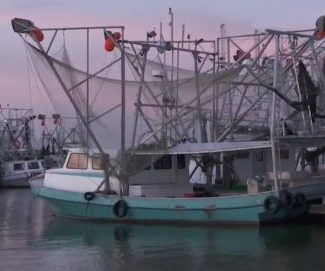
Threatened Catch
It’s the Sunday after Thanksgiving. And in case you’re tired of turkey, we have a helping of shrimp and a few questions. You may not think much about how the seafood gets to your plate.But the question of who’s catching it and where is at the center of a global controversy. To understand why, we head south to the Louisiana bayou. It’s where an industry that survived Hurricane Katrina and the BP oil spill is finding itself threatened with extinction by foreign competition. These fishermen could be Shrimpers Lost… and theirs could be a lesson for us all. Today we’re going shrimping in Venice, Louisiana. Acy Cooper is our guide. Sharyl Attkisson: How important is the shrimping business to your personally? Acy Cooper: It’s everything to me. You know, my family does it. My dad’s 80 years old, he still fishes. And my two boys has entered the business, and my daughter she married a fisherman. Louisiana’s shrimp industry has been a family affair for more than a century. Video, read the rest here 16:04
Lobster season on Nova Scotia’s southwest coast delayed by bad weather
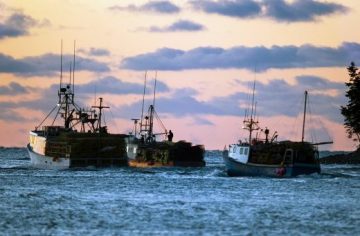 The lobster season on Nova Scotia’s southwest coast has been delayed by one day due to high winds a rough seas. The season was supposed to start Monday but has been put off until Tuesday morning at 6 a.m., said Graeme Gawn president of local 9 with the Maritime Fishermen’s Union. “It’s always frustrating because everybody is ready to go and they want to go, but nobody wants to get hurt and nobody wants to see their crews get hurt.” Gawn said the Department of Fisheries and Oceans made the decision Sunday morning on a conference call. The first day of the lobster season, referred to as dumping day, is when fishermen first set their lobster traps, it’s considered one of the most dangerous days of the entire season. Most fishermen are more than happy to wait until the weather is more cooperative to head out on the water, said Gawn. Read the rest here 12:24
The lobster season on Nova Scotia’s southwest coast has been delayed by one day due to high winds a rough seas. The season was supposed to start Monday but has been put off until Tuesday morning at 6 a.m., said Graeme Gawn president of local 9 with the Maritime Fishermen’s Union. “It’s always frustrating because everybody is ready to go and they want to go, but nobody wants to get hurt and nobody wants to see their crews get hurt.” Gawn said the Department of Fisheries and Oceans made the decision Sunday morning on a conference call. The first day of the lobster season, referred to as dumping day, is when fishermen first set their lobster traps, it’s considered one of the most dangerous days of the entire season. Most fishermen are more than happy to wait until the weather is more cooperative to head out on the water, said Gawn. Read the rest here 12:24
Effort to protect deep-sea coral has lobster industry on alert
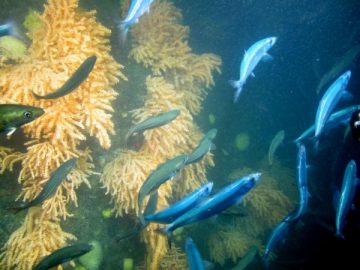 Over 400 Maine lobstermen could lose their traditional fishing territory under a proposal to protect deep-sea corals in the Gulf of Maine. The New England Fishery Management Council is considering a plan that would ban fishing in four designated coral zones spanning about 161 miles of federal waters in the Gulf of Maine – Mount Desert Rock, Outer Schoodic Ridge, Jordan Basin and Lindenkohl Knoll. Here, often on steep rock walls deep under water where sunlight cannot penetrate, scientists have found dense, delicate and slow-growing coral gardens of sea whips, fans and pens. During the cold-weather months, when 52-year-old Jim Dow usually fishes for hard-shell lobsters in deep federal waters, his buoys will encircle Mount Desert Rock, where the lobster is so plentiful that boats will sail for hours to drop traps there. As a result, fishermen call it the Meeting Grounds. He said word is just starting to spread about the coral protection plan, but he said the fishermen he has talked with say they didn’t even know there was coral in the deep canyons below. Read the rest here 10:16
Over 400 Maine lobstermen could lose their traditional fishing territory under a proposal to protect deep-sea corals in the Gulf of Maine. The New England Fishery Management Council is considering a plan that would ban fishing in four designated coral zones spanning about 161 miles of federal waters in the Gulf of Maine – Mount Desert Rock, Outer Schoodic Ridge, Jordan Basin and Lindenkohl Knoll. Here, often on steep rock walls deep under water where sunlight cannot penetrate, scientists have found dense, delicate and slow-growing coral gardens of sea whips, fans and pens. During the cold-weather months, when 52-year-old Jim Dow usually fishes for hard-shell lobsters in deep federal waters, his buoys will encircle Mount Desert Rock, where the lobster is so plentiful that boats will sail for hours to drop traps there. As a result, fishermen call it the Meeting Grounds. He said word is just starting to spread about the coral protection plan, but he said the fishermen he has talked with say they didn’t even know there was coral in the deep canyons below. Read the rest here 10:16
N.C. Wildlife Federation Rule Making Petition’s aim: Gear bans or resource protection?
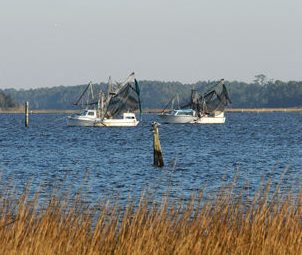 A conservation organization’s request that the state adopt stricter rules for shrimping and recreational spot and croaker isn’t sitting well with a local seafood industry advocacy group. Jerry Schill, president of the N.C. Fisheries Association, a nonprofit organization dedicated to promoting the state fishing industry, says the association thinks the petition for rulemaking from the N.C. Wildlife Federation, a nonprofit dedicated to protecting the state’s natural resources, will lead to gear bans that could put shrimping in North Carolina in jeopardy. However, David Knight, NCWF policy consultant, said the petition is meant to protect fish and their habitat and actually assist fishing communities by doing so. The Southern Environmental Law Center presented a petition for rulemaking, on behalf of the NCWF, to the N.C. Marine Fisheries Commission Nov. 17 in Kitty Hawk at the commission’s regular meeting. Read the rest here 08:57
A conservation organization’s request that the state adopt stricter rules for shrimping and recreational spot and croaker isn’t sitting well with a local seafood industry advocacy group. Jerry Schill, president of the N.C. Fisheries Association, a nonprofit organization dedicated to promoting the state fishing industry, says the association thinks the petition for rulemaking from the N.C. Wildlife Federation, a nonprofit dedicated to protecting the state’s natural resources, will lead to gear bans that could put shrimping in North Carolina in jeopardy. However, David Knight, NCWF policy consultant, said the petition is meant to protect fish and their habitat and actually assist fishing communities by doing so. The Southern Environmental Law Center presented a petition for rulemaking, on behalf of the NCWF, to the N.C. Marine Fisheries Commission Nov. 17 in Kitty Hawk at the commission’s regular meeting. Read the rest here 08:57
How the privatization of our oceans is sinking fishermen
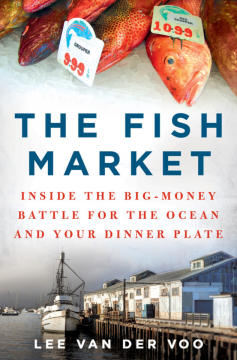 The town of St. George, off the Bering Sea near Alaska, was long home to some of the most robust pollock fishing in the country. But due to a fishing rights management scheme called “catch shares,” the town has no rights to fish its own waters and regularly watches their former industry literally pass them by. “Every year, the industry takes about $2 billion in gains out of this fish resource on the Bering Sea,” St. George Mayor Pat Pletnikoff tells Lee van der Voo in “The Fish Market.” “Not one plug nickel sticks to St. George.” Catch shares work by dividing our oceans just like any other physical property, creating theoretical property lines. Then the rights to fish different species in various sections are awarded to applicants — which could be individuals or companies — based on how much fish they catch over a certain period of time. While catch shares are credited with greater species management — the US government found in 2007 that of 230 species of fish, 92 were going quickly extinct due to overfishing — the catch-shares program has virtually privatized our oceans, destroying the livelihoods of many lifelong fishermen and other small businesses in the process. Read the rest here 08:14
The town of St. George, off the Bering Sea near Alaska, was long home to some of the most robust pollock fishing in the country. But due to a fishing rights management scheme called “catch shares,” the town has no rights to fish its own waters and regularly watches their former industry literally pass them by. “Every year, the industry takes about $2 billion in gains out of this fish resource on the Bering Sea,” St. George Mayor Pat Pletnikoff tells Lee van der Voo in “The Fish Market.” “Not one plug nickel sticks to St. George.” Catch shares work by dividing our oceans just like any other physical property, creating theoretical property lines. Then the rights to fish different species in various sections are awarded to applicants — which could be individuals or companies — based on how much fish they catch over a certain period of time. While catch shares are credited with greater species management — the US government found in 2007 that of 230 species of fish, 92 were going quickly extinct due to overfishing — the catch-shares program has virtually privatized our oceans, destroying the livelihoods of many lifelong fishermen and other small businesses in the process. Read the rest here 08:14
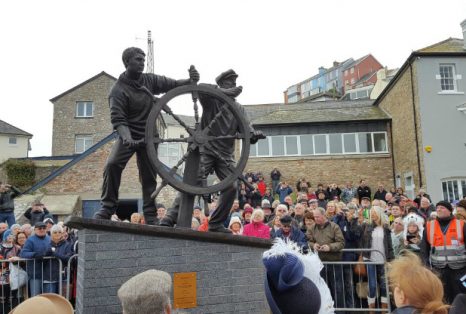
Statute Unveiled – Brixham honours fishermen lost at sea
A statue to honour those lost at sea has been unveiled at one of the UK’s last fishing ports after a decade of fundraising. It took residents in Brixham, Devon, 10 years to raise the £76,000 needed. Artist Elizabeth Hadley was commissioned to create the bronze life-size Man and Boy statue. Eighty-three British commercial fishermen died in the past decade at sea, according to the Marine Accident Investigation Branch. Victoria Bowen, who helped fundraise said: “It’s a high-risk industry and it’s important people remember what these guys face when they are bringing home what they call ‘the silvery harvest’.” Read the rest here with 19:00
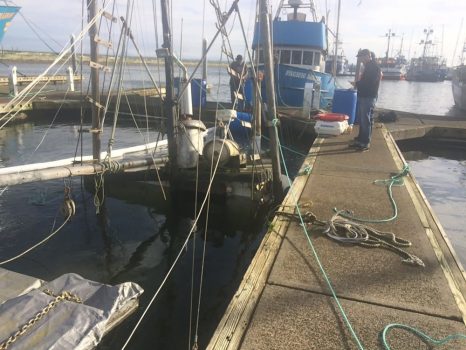
Coast Guard, Washington State Department of Ecology respond to sunken vessel in Westport, Wash.
Coast Guard and Washington State Department of Ecology crews responded to a 41-foot vessel that sank at the Westport Marina, Friday. Coast Guard Incident Management Division personnel, from Coast Guard Sector Columbia River in Warrenton, are monitoring salvage and clean up efforts as Ballard Marine Construction response contractors start to remove fuel from the vessel Saturday. Watchstanders at Coast Guard 13th District Command Center in Seattle received a notification at 12:52 a.m., Friday, from the emergency position indicating radio beacon aboard the vessel Charlotte. A crew from Coast Guard Station Grays Harbor investigated the location of the beacon and found the sunken vessel, while watchstanders were able to contact the vessel owner and confirm they were safe elsewhere. Read the rest here 16:56
N.C. Commercial fishermen needed to help clean up fishing gear in coastal waters
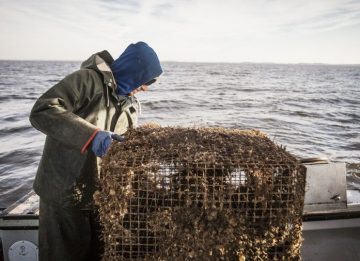 The North Carolina Coastal Federation is currently accepting applications from commercial fishermen interested in assisting with an on-water cleanup of lost fishing gear from coastal waters. To qualify, watermen must have a valid Standard Commercial Fishing License and guarantee availability for work during the period of Jan. 18 through Feb. 7. They must also attend a mandatory training session to learn general project protocol and how to use project equipment. Compensation is $400 per boat, per day. Each boat is required to have two people onboard for safety reasons. In some locations, more than one week of work could be possible for those accepted to this program. Read the rest here, including contact info 15:04
The North Carolina Coastal Federation is currently accepting applications from commercial fishermen interested in assisting with an on-water cleanup of lost fishing gear from coastal waters. To qualify, watermen must have a valid Standard Commercial Fishing License and guarantee availability for work during the period of Jan. 18 through Feb. 7. They must also attend a mandatory training session to learn general project protocol and how to use project equipment. Compensation is $400 per boat, per day. Each boat is required to have two people onboard for safety reasons. In some locations, more than one week of work could be possible for those accepted to this program. Read the rest here, including contact info 15:04
Dumping Day Update: Weather delays opening
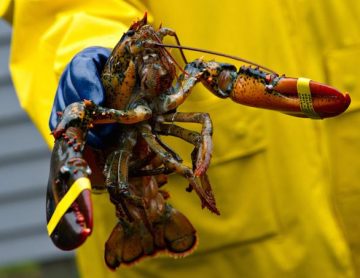 Forecast rain, snow and wind have delayed the opening of the lobster season in southwest Nova Scotia. A decision was made midday Saturday not to go ahead with Monday’s “dumping day” in lobster fishing Areas 33 and 34. Officials will decide on Sunday morning whether Tuesday should be dumping day. Environment Canada has issued a special weather statement for Halifax, Lunenburg and Queens counties because of a low pressure system that’s expected to bring rain and snow over the weekend. Boats piled high with lobster traps in area 34 were to leave the wharves at 6 a.m. Monday and at 7 a.m. Monday in area 33. The province is reminding people who make their living on the water to be safe. Read the rest here 13:35
Forecast rain, snow and wind have delayed the opening of the lobster season in southwest Nova Scotia. A decision was made midday Saturday not to go ahead with Monday’s “dumping day” in lobster fishing Areas 33 and 34. Officials will decide on Sunday morning whether Tuesday should be dumping day. Environment Canada has issued a special weather statement for Halifax, Lunenburg and Queens counties because of a low pressure system that’s expected to bring rain and snow over the weekend. Boats piled high with lobster traps in area 34 were to leave the wharves at 6 a.m. Monday and at 7 a.m. Monday in area 33. The province is reminding people who make their living on the water to be safe. Read the rest here 13:35
Crab pots set to drop
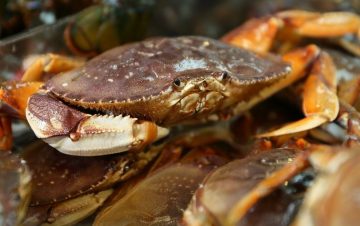 Spirits were high at the Crescent City Harbor as fishermen prepared crab pots and loaded gear onto boats Friday. Del Norte’s commercial Dungeness fishery is scheduled to open on time next week despite a delay to the season between according to the California Department of Fish and Wildlife. Local crabbers will be able to drop their pots at 8 a.m. Monday and retrieve their catch starting at 12:01 a.m. Thursday. “We’re very excited to go fishing after the catastrophe last year,” said Richard Nehmer, who was loading more than 400 crab pots onto his fishing vessel, “Resolution.” “The crab were excellent quality when they did the pre-season quality test,” Nehmer said. “They’re ready to harvest.” Last year’s delay to the crab fishery left many in the industry, including local fisherman Mike Diehl, struggling to make ends meet. “Right now I’m six months behind in rent,” Diehl said. “I used to have a pickup truck and a couple cars; I’ve had to sell off most of that stuff. I’ve pretty much been living without any heat in the house for the last four or five months, which was OK until this last month. There’s no money to be spent on anything; no Christmas, reduced birthdays.” Read the story here 11:16
Spirits were high at the Crescent City Harbor as fishermen prepared crab pots and loaded gear onto boats Friday. Del Norte’s commercial Dungeness fishery is scheduled to open on time next week despite a delay to the season between according to the California Department of Fish and Wildlife. Local crabbers will be able to drop their pots at 8 a.m. Monday and retrieve their catch starting at 12:01 a.m. Thursday. “We’re very excited to go fishing after the catastrophe last year,” said Richard Nehmer, who was loading more than 400 crab pots onto his fishing vessel, “Resolution.” “The crab were excellent quality when they did the pre-season quality test,” Nehmer said. “They’re ready to harvest.” Last year’s delay to the crab fishery left many in the industry, including local fisherman Mike Diehl, struggling to make ends meet. “Right now I’m six months behind in rent,” Diehl said. “I used to have a pickup truck and a couple cars; I’ve had to sell off most of that stuff. I’ve pretty much been living without any heat in the house for the last four or five months, which was OK until this last month. There’s no money to be spent on anything; no Christmas, reduced birthdays.” Read the story here 11:16
Prospect of “China” fisheries deal still of great concern for Bahamians
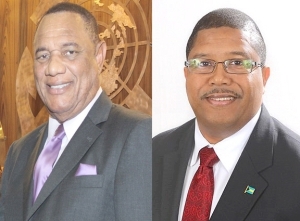 Since Agriculture and Marine Resources Minister V. Alfred Gray gave permission for Bahamian Ambassador to China Paul Andy Gomez to discuss further a $2.1 billion proposal for an agriculture/fisheries project with the Chinese government, the matter has been a hot topic in the country. The proposal, if approved would allow the Bahamas government to lease up to a total of 10,000 acres of crown land in Andros to 100 companies owned 50-50 by Bahamians and the Chinese. On social media and openly in public it is clear that this proposal has not struck home well, and as a result ‘Black Friday Marches’ have been organized to allow persons to show the growing concern with regard to this proposal that has sparked considerable fear. Grand Bahama resident and politician, the Deputy Leader of the Opposition and Member of Parliament for East Grand Bahama, K. Peter Turnquest expressed his views to The Freeport News. Read the story here 09:48
Since Agriculture and Marine Resources Minister V. Alfred Gray gave permission for Bahamian Ambassador to China Paul Andy Gomez to discuss further a $2.1 billion proposal for an agriculture/fisheries project with the Chinese government, the matter has been a hot topic in the country. The proposal, if approved would allow the Bahamas government to lease up to a total of 10,000 acres of crown land in Andros to 100 companies owned 50-50 by Bahamians and the Chinese. On social media and openly in public it is clear that this proposal has not struck home well, and as a result ‘Black Friday Marches’ have been organized to allow persons to show the growing concern with regard to this proposal that has sparked considerable fear. Grand Bahama resident and politician, the Deputy Leader of the Opposition and Member of Parliament for East Grand Bahama, K. Peter Turnquest expressed his views to The Freeport News. Read the story here 09:48
Weather may delay opening of lobster season
 Rain, snow and wind could delay the opening of the lobster season in southwest Nova Scotia. Lobster Fishing Areas 33 and 34 are expected to make a decision about whether to go ahead with Monday’s “dumping day” late Saturday morning. Environment Canada has issued a special weather statement for Halifax, Lunenburg and Queens counties because of a low pressure system that’s expected to bring rain and snow over the weekend. But if the weather is fine, boats piled high with lobster traps in LFA 34 will leave the wharves at 6 a.m. and in LFA 33, at 7 a.m. Whether or not fishermen will be setting their traps on Monday, the province is reminding people who make their living on the water to be safe. Read the rest here 08:52
Rain, snow and wind could delay the opening of the lobster season in southwest Nova Scotia. Lobster Fishing Areas 33 and 34 are expected to make a decision about whether to go ahead with Monday’s “dumping day” late Saturday morning. Environment Canada has issued a special weather statement for Halifax, Lunenburg and Queens counties because of a low pressure system that’s expected to bring rain and snow over the weekend. But if the weather is fine, boats piled high with lobster traps in LFA 34 will leave the wharves at 6 a.m. and in LFA 33, at 7 a.m. Whether or not fishermen will be setting their traps on Monday, the province is reminding people who make their living on the water to be safe. Read the rest here 08:52
Carlos ‘Codfather’ Rafael, Bristol County sheriff’s deputy seek seperate trials
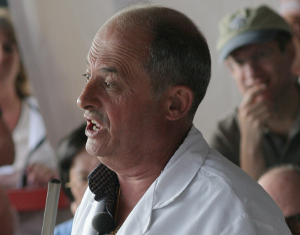 New Bedford fishing kingpin Carlos Rafael and the Bristol County sheriff’s deputy indicted as Rafael’s co-defendant each are seeking to be tried separately in U.S. District Court in Boston. Rafael, known widely as “The Codfather” because of his vast New Bedford fishing assets and waterfront holdings, and Antonio M. Freitas, the Bristol County deputy sheriff, are scheduled to stand trial together on Jan. 9. Attorneys for both men filed separate motions with the court earlier this week to sever the cases. The motions also seeks to have the court try each defendant separately, each claiming the other’s statements to law enforcement officials would injure their own cases if tried together. Both men have pleaded not guilty to the charges. “A joint trial presents a serious risk of compromising Mr. Rafael’s Sixth Amendment confrontation rights in light of incriminating evidence made to law enforcement by Mr. Freitas,” William Kettlewell, Rafael’s defense attorney, wrote in his motion to U. S. District Court Judge William Young. “Moreover, severance in this case would not be administratively burdensome as the defendants are jointly named in only one of 28 counts alleged in the indictment.” Read the story here 08:14
New Bedford fishing kingpin Carlos Rafael and the Bristol County sheriff’s deputy indicted as Rafael’s co-defendant each are seeking to be tried separately in U.S. District Court in Boston. Rafael, known widely as “The Codfather” because of his vast New Bedford fishing assets and waterfront holdings, and Antonio M. Freitas, the Bristol County deputy sheriff, are scheduled to stand trial together on Jan. 9. Attorneys for both men filed separate motions with the court earlier this week to sever the cases. The motions also seeks to have the court try each defendant separately, each claiming the other’s statements to law enforcement officials would injure their own cases if tried together. Both men have pleaded not guilty to the charges. “A joint trial presents a serious risk of compromising Mr. Rafael’s Sixth Amendment confrontation rights in light of incriminating evidence made to law enforcement by Mr. Freitas,” William Kettlewell, Rafael’s defense attorney, wrote in his motion to U. S. District Court Judge William Young. “Moreover, severance in this case would not be administratively burdensome as the defendants are jointly named in only one of 28 counts alleged in the indictment.” Read the story here 08:14
Northern cod plan kept from harvesters, FISH-NL’s Ryan Cleary says, FFAW Fires Back
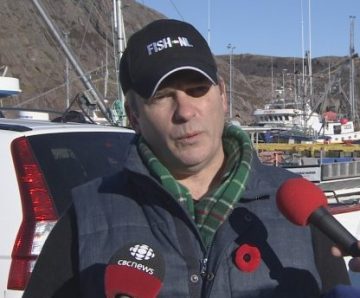 Almost six months after the FFAW and a number of seafood processors pitched it to the federal government, the breakaway group says it has obtained a copy of the 2016 Northern Cod Management Plan. Ottawa approved the plan in early August. Despite numerous public requests, the FFAW refused to release a copy to its membership, FISH-NL said in a news release Friday. “The stewardship plan is the most important document involving northern cod since the 1992 moratorium and not only weren’t fish harvesters consulted, the final plan was kept secret from them,” FISH-NL president Ryan Cleary said. Harvesters around the province have complained they weren’t consulted before the plan was handed down. Read the rest here. FFAW Press Release – Today, FISHNL’s Ryan Cleary called into question whether there should be an inshore northern cod fishery. Read the press release here 13:58
Almost six months after the FFAW and a number of seafood processors pitched it to the federal government, the breakaway group says it has obtained a copy of the 2016 Northern Cod Management Plan. Ottawa approved the plan in early August. Despite numerous public requests, the FFAW refused to release a copy to its membership, FISH-NL said in a news release Friday. “The stewardship plan is the most important document involving northern cod since the 1992 moratorium and not only weren’t fish harvesters consulted, the final plan was kept secret from them,” FISH-NL president Ryan Cleary said. Harvesters around the province have complained they weren’t consulted before the plan was handed down. Read the rest here. FFAW Press Release – Today, FISHNL’s Ryan Cleary called into question whether there should be an inshore northern cod fishery. Read the press release here 13:58
Provincial investment ‘absolutely necessary’ for massive Placentia Bay $230-million aquaculture project
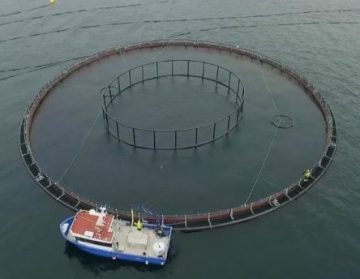 The companies behind a massive aquaculture project proposed for say government investment is “absolutely necessary,” but Fisheries and Aquaculture Minister Steve Crocker says the province will not be rushed into a decision. A spokesman for Grieg NL Nurseries and Grieg NL Seafarms told CBC News Thursday that an equity share in the $230-million project will be a “safe” investment for the province. “This is an excellent investment which will grow and pay the province back tenfold in both taxation and employment,” said Greig’s Perry Power.When asked if the project’s sanctioning hinges on an infusion of government money, Power said “my understanding has always been, in the position that I’m in, that the province’s involvement is absolutely necessary.” Grieg wants to construct the world’s largest salmon hatchery in Marystown, and create 11 “escape-proof” cage sites in Placentia Bay. Read the rest here 13:04
The companies behind a massive aquaculture project proposed for say government investment is “absolutely necessary,” but Fisheries and Aquaculture Minister Steve Crocker says the province will not be rushed into a decision. A spokesman for Grieg NL Nurseries and Grieg NL Seafarms told CBC News Thursday that an equity share in the $230-million project will be a “safe” investment for the province. “This is an excellent investment which will grow and pay the province back tenfold in both taxation and employment,” said Greig’s Perry Power.When asked if the project’s sanctioning hinges on an infusion of government money, Power said “my understanding has always been, in the position that I’m in, that the province’s involvement is absolutely necessary.” Grieg wants to construct the world’s largest salmon hatchery in Marystown, and create 11 “escape-proof” cage sites in Placentia Bay. Read the rest here 13:04
The real reason why you’re suddenly seeing whales in N.J. and N.Y. waters
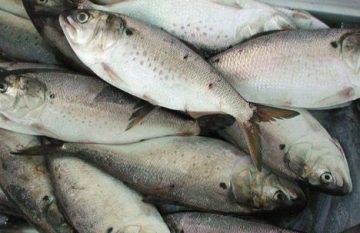 Whales. They’ve been seemingly everywhere. Breaching just past the sandbars in Asbury Park. Swimming past groups of surfers in Rockaway Beach. Besides inspiring a chorus of oohs and aahs, the increase in sightings is adding a blubbery new wrinkle to a raging debate over a far smaller fish: the Atlantic menhaden. It’s the menhaden, also known as “bunker” — clumsy, multidinous, slow swimming virtual floating hamburgers — that those whales are chasing. But the story of why Atlantic menhaden is suddenly so plentiful is a complicated — and controversial — one, pitting environmentalists and anglers against commercial fishing operations, with both sides claiming science is on their side. Read the story here 12:33
Whales. They’ve been seemingly everywhere. Breaching just past the sandbars in Asbury Park. Swimming past groups of surfers in Rockaway Beach. Besides inspiring a chorus of oohs and aahs, the increase in sightings is adding a blubbery new wrinkle to a raging debate over a far smaller fish: the Atlantic menhaden. It’s the menhaden, also known as “bunker” — clumsy, multidinous, slow swimming virtual floating hamburgers — that those whales are chasing. But the story of why Atlantic menhaden is suddenly so plentiful is a complicated — and controversial — one, pitting environmentalists and anglers against commercial fishing operations, with both sides claiming science is on their side. Read the story here 12:33
Crabbing halted off Oregon coast
 State agriculture officials in Oregon have shut down commercial and recreational crabbing along the entire coast because of high levels of domoic acid found in the crabs’ flesh. The says the ban includes the harvest of Dungeness and red rock crab in bays and estuaries, off docks, piers, jetties and in the ocean. Consumption of domoic acid can result in dizziness, headaches, vomiting and diarrhea. More severe cases can result in memory loss and death. Closure of the crab season last year along the Pacific coast due to domoic acid contamination caused crabbers to lose millions. Despite the delay, crab and shellfish products sold in retail markets and restaurants remain safe for consumers. Link 08:40
State agriculture officials in Oregon have shut down commercial and recreational crabbing along the entire coast because of high levels of domoic acid found in the crabs’ flesh. The says the ban includes the harvest of Dungeness and red rock crab in bays and estuaries, off docks, piers, jetties and in the ocean. Consumption of domoic acid can result in dizziness, headaches, vomiting and diarrhea. More severe cases can result in memory loss and death. Closure of the crab season last year along the Pacific coast due to domoic acid contamination caused crabbers to lose millions. Despite the delay, crab and shellfish products sold in retail markets and restaurants remain safe for consumers. Link 08:40
Glow-in-the-dark rope a lifesaver at sea, Halifax maker says
 Matthew Moore is no stranger to the Atlantic Ocean where he spent many days fishing for fun as he grew up in Halifax. But he has also seen just how treacherous the sea can be. When he was 20, he lost a friend to it. That tragedy instilled in Mr. Moore a keen interest in marine safety. He serviced lifesaving appliances such as life rafts and lifebuoys (personal flotation devices with a buoyant rope attached) on the East Coast before moving to New Zealand to run a marine-safety company for several years. When Mr. Moore heard about a Swiss-made synthetic, luminescent fibre, a light bulb went on. He secured the sole rights to that material and, along with his father, developed a buoyant rope that glows in the dark. With it, he’s hoping to propel his company, Canada Rope and Twine Ltd., to commercial success while saving lives at the same time. Read the story here 08:14
Matthew Moore is no stranger to the Atlantic Ocean where he spent many days fishing for fun as he grew up in Halifax. But he has also seen just how treacherous the sea can be. When he was 20, he lost a friend to it. That tragedy instilled in Mr. Moore a keen interest in marine safety. He serviced lifesaving appliances such as life rafts and lifebuoys (personal flotation devices with a buoyant rope attached) on the East Coast before moving to New Zealand to run a marine-safety company for several years. When Mr. Moore heard about a Swiss-made synthetic, luminescent fibre, a light bulb went on. He secured the sole rights to that material and, along with his father, developed a buoyant rope that glows in the dark. With it, he’s hoping to propel his company, Canada Rope and Twine Ltd., to commercial success while saving lives at the same time. Read the story here 08:14
A father and son in St. Bernard Parish have a lot to be thankful for this Thanksgiving
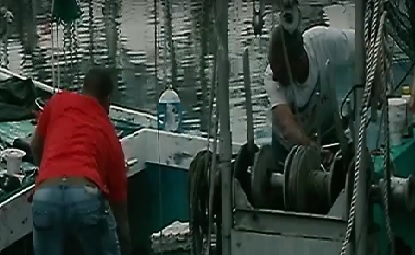 They said they almost died after their shrimp boat sank. After being stranded for hours, they were rescued by the U.S. Coast Guard when another boater called for help. WDSU obtained video shot by the Coast Guard of the moment Daniel Scott and his stepfather, Joseph Mitchell, were rescued on Lake Borgne in Hopedale Saturday. “I broke down night before last after we got home,” Mitchell said. “I cried and I cried thinking about losing my son’s life.” The two were out shrimping. Winds picked up, the waves started crashing and the boat started sinking. “In a matter of seconds, Jo, my stepdad said, ‘Grab the life preservers,’ which we did,” Scott said. “I climbed out the window pulled him out the window. By that time the boat was under and we climbed up and hung out for about five hours and realized there is nobody out there to help us.” Video, read the story here 17:23
They said they almost died after their shrimp boat sank. After being stranded for hours, they were rescued by the U.S. Coast Guard when another boater called for help. WDSU obtained video shot by the Coast Guard of the moment Daniel Scott and his stepfather, Joseph Mitchell, were rescued on Lake Borgne in Hopedale Saturday. “I broke down night before last after we got home,” Mitchell said. “I cried and I cried thinking about losing my son’s life.” The two were out shrimping. Winds picked up, the waves started crashing and the boat started sinking. “In a matter of seconds, Jo, my stepdad said, ‘Grab the life preservers,’ which we did,” Scott said. “I climbed out the window pulled him out the window. By that time the boat was under and we climbed up and hung out for about five hours and realized there is nobody out there to help us.” Video, read the story here 17:23

Southeast rivers are economic gold mine
An economic study commissioned by Salmon Beyond Borders concludes that transboundary watersheds facing potential adverse impact from British Columbia mines are valued at just under $1 million, when considering a 30-year horizon. The study by the McDowell Group, a Juneau research and consulting firm, measures the economic impact of the Taku, Stikine and Unuk river watersheds on the Southeast Alaska economy. The study found that, combined, these watersheds account for $48 million in direct spending, 400 jobs for the Southeast region and nearly $20 million in labor income. The study, released in late November, also estimated the exvessel value and first wholesale value of Mass and Skeena River sockeye salmon caught commercially as $620,000 and over $1.3 million respectively. Salmon Beyond Borders is a campaign driven by sport and commercial fish harvesters, community leaders, tourism and recreation business owners and concerned citizens, in collaboration with tribes and First Nations on both sides of the international border. Read the story here 12:44
Letter: We’ve seen the future, and it’s land-based – John McCarthy
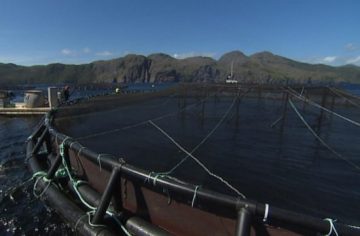 I write in response to a letter written by Leon Fiander from Marystown on Oct. 18, “Will Placentia Bay aquaculture affect native salmon?” Our group, Salmon Preservation Association for the Waters of Newfoundland (SPAWN), has met with Environment Minister Perry Trimper and provincial officials, executive director Mark Lane and other officials of the Newfoundland Aquaculture Industry Association, Gudie Hutchings, MP for Long Range Mountains, and others. We have tried to establish exactly what is being proposed for aquaculture in Placentia Bay. We have a good track record of meeting and working with industry to mitigate potential environmental issues and have worked out of the public eye with Kruger and other industries successfully over the years. We continue to correspond with Mark Lane regarding the interaction between aquaculture and our environment. Fiander’s letter appears to us to be more like a job application than an actual letter of approval for Placentia Bay sea-cage aquaculture. Read the rest here 12:08
I write in response to a letter written by Leon Fiander from Marystown on Oct. 18, “Will Placentia Bay aquaculture affect native salmon?” Our group, Salmon Preservation Association for the Waters of Newfoundland (SPAWN), has met with Environment Minister Perry Trimper and provincial officials, executive director Mark Lane and other officials of the Newfoundland Aquaculture Industry Association, Gudie Hutchings, MP for Long Range Mountains, and others. We have tried to establish exactly what is being proposed for aquaculture in Placentia Bay. We have a good track record of meeting and working with industry to mitigate potential environmental issues and have worked out of the public eye with Kruger and other industries successfully over the years. We continue to correspond with Mark Lane regarding the interaction between aquaculture and our environment. Fiander’s letter appears to us to be more like a job application than an actual letter of approval for Placentia Bay sea-cage aquaculture. Read the rest here 12:08
Queensland’s trawling industry under threat over low scallop numbers
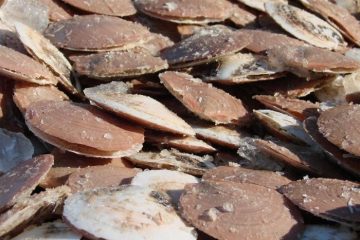 Scallop fishers have been told the Federal Government may step in and restrict fishing and exports for the entire trawling industry in Queensland if stock numbers do not dramatically improve. The warning came at a meeting at Bundaberg, which was the culmination of two days worth of talks between industry and the State Government about the dire state of the scallop stock. Fisheries Minister Bill Byrne announced last week he would close stock replenishment areas (SRAs) and introduce a winter spawning closure, in the wake of a stock assessment that put the biomass level at 6 per cent of 1977 levels. But emotional, frustrated and at times hostile fishermen and processors disputed the assessment. The industry has questioned how a fishery that had been managed for decades could end up in this position. Stephen Murphy, from Hervey Bay Cold Stores, said the fishing industry should not bear all the blame for the situation, saying climate and environmental issues also played a part. “Especially things like the Gladstone dredging. As soon as they started that dredging for the LNG project, they dumped millions and millions of tonnes of spoil from that harbour on to pretty well the best scallop grounds in Queensland,” he said. Read the article here 11:18
Scallop fishers have been told the Federal Government may step in and restrict fishing and exports for the entire trawling industry in Queensland if stock numbers do not dramatically improve. The warning came at a meeting at Bundaberg, which was the culmination of two days worth of talks between industry and the State Government about the dire state of the scallop stock. Fisheries Minister Bill Byrne announced last week he would close stock replenishment areas (SRAs) and introduce a winter spawning closure, in the wake of a stock assessment that put the biomass level at 6 per cent of 1977 levels. But emotional, frustrated and at times hostile fishermen and processors disputed the assessment. The industry has questioned how a fishery that had been managed for decades could end up in this position. Stephen Murphy, from Hervey Bay Cold Stores, said the fishing industry should not bear all the blame for the situation, saying climate and environmental issues also played a part. “Especially things like the Gladstone dredging. As soon as they started that dredging for the LNG project, they dumped millions and millions of tonnes of spoil from that harbour on to pretty well the best scallop grounds in Queensland,” he said. Read the article here 11:18
Sometimes the opening of lobster fishing off southwestern Nova Scotia goes off without a hitch. And sometimes not.
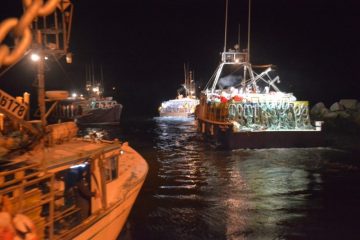 In the present day, there are 979 licences in Lobster Fishing Area (LFA) 34, which is slated to see its season start with Dumping Day on Monday, Nov. 28. The neighbouring LFA 33 along the province’s south shore also opens the same day. As fishermen gear up for the start of another lobster season, he’s a look back at some season starts of years gone by. 2015: Good start, good price Last year’s lobster season got off to a good start with decent opening day weather and better yet, a better price than in previous years. Fishermen were being paid around $6 a pound for their landings. 2014: Six-day weather delay,,, Read the rest here 10:05
In the present day, there are 979 licences in Lobster Fishing Area (LFA) 34, which is slated to see its season start with Dumping Day on Monday, Nov. 28. The neighbouring LFA 33 along the province’s south shore also opens the same day. As fishermen gear up for the start of another lobster season, he’s a look back at some season starts of years gone by. 2015: Good start, good price Last year’s lobster season got off to a good start with decent opening day weather and better yet, a better price than in previous years. Fishermen were being paid around $6 a pound for their landings. 2014: Six-day weather delay,,, Read the rest here 10:05
Baltimore Canyon Urban National Marine Sanctuary process will go forward
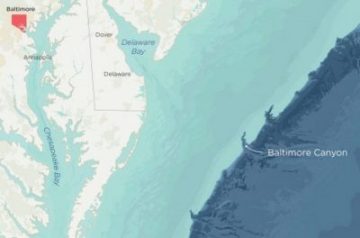 A month ago, the National Aquarium launched a petition to establish the 28-mile long underwater rift as its first Urban National Marine Sanctuary. The designation would help protect the rare deep-sea coral and ecosystem in the Baltimore Canyon by restricting offshore exploration for minerals, oil and gas. Since the canyon is one of the cornerstones of Ocean City’s fishing industry and, hence, its tourism market, sports fishing advocates have been pushing back on the designation. That culminated in a two-hour forum last week. Charter boat captain Franky Pettolina, the Ocean City Marlin Club president, saw the summit as a symbol of goodwill, but thought that the marine community argued in vain. Under the National Marine Sanctuaries Act, any action that removes, injures or damages any sanctuary resource, fish included, are prohibited. National Aquarium Director of Conservation Laura Bankey, who attended the meeting, said people will still be able to fish if the Baltimore Canyon is made a marine sanctuary. “Unlike land conservation areas, everything is allowed to continue until it is closed off [in a marine sanctuary],” Bankey said. “Sanctuaries are supposed to be multi-use areas. It’s our intention that recreation and commercial fisheries will be able to use these just like they do today.” Read the rest here 09:14
A month ago, the National Aquarium launched a petition to establish the 28-mile long underwater rift as its first Urban National Marine Sanctuary. The designation would help protect the rare deep-sea coral and ecosystem in the Baltimore Canyon by restricting offshore exploration for minerals, oil and gas. Since the canyon is one of the cornerstones of Ocean City’s fishing industry and, hence, its tourism market, sports fishing advocates have been pushing back on the designation. That culminated in a two-hour forum last week. Charter boat captain Franky Pettolina, the Ocean City Marlin Club president, saw the summit as a symbol of goodwill, but thought that the marine community argued in vain. Under the National Marine Sanctuaries Act, any action that removes, injures or damages any sanctuary resource, fish included, are prohibited. National Aquarium Director of Conservation Laura Bankey, who attended the meeting, said people will still be able to fish if the Baltimore Canyon is made a marine sanctuary. “Unlike land conservation areas, everything is allowed to continue until it is closed off [in a marine sanctuary],” Bankey said. “Sanctuaries are supposed to be multi-use areas. It’s our intention that recreation and commercial fisheries will be able to use these just like they do today.” Read the rest here 09:14

Happy Thanksgiving
Thanksgiving For each new morning with its light, For rest and shelter of the night, For health and food, For love and friends, For everything Thy goodness sends. – Ralph Waldo Emerson (1803-1882)
Enviros Stressed! How We Can Defend the Ocean now that Trump Will Be at the Helm of the Ship of State
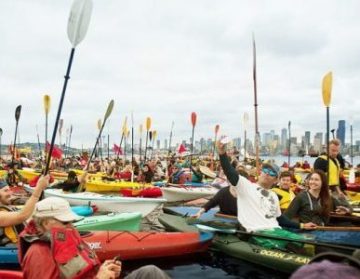 Like a rogue wave the Election Day victory of Donald Trump for President has left about half the nation stunned and the other half giddy. Among those most worried – environmentalists who are girding for a long series of battles around climate and expecting attacks on keystone agencies, executive orders and legislation including pollution emission standards, the Clean Water Act and the EPA. As Ocean conservationists we face huge challenges including the prospect of the National Ocean Policy being deep sixed. President Obama launched this in 2010 with the intent to encourage closer collaboration between federal agencies and to coordinate ocean uses at the regional level. What former Coast Guard Commandant Thad Allen called, “putting urban planning into the water column.” Still, some Republicans consider it the Obamacare of the Ocean so there’s a strong likelihood it will be scuttled. We can also expect continued Senate inaction on ratifying the Law of the Seas Convention, the UN treaty by which most of the world’s nations agree on issues relating to navigation, scientific exploration and territorial claims on and below the ocean. Hillary Clinton had pledged to see it passed if she became President but some Senate Republicans see it as a UN power grab. Because of this, we expect the U.S. to remain a non-signatory power. Read the rest here 16:54
Like a rogue wave the Election Day victory of Donald Trump for President has left about half the nation stunned and the other half giddy. Among those most worried – environmentalists who are girding for a long series of battles around climate and expecting attacks on keystone agencies, executive orders and legislation including pollution emission standards, the Clean Water Act and the EPA. As Ocean conservationists we face huge challenges including the prospect of the National Ocean Policy being deep sixed. President Obama launched this in 2010 with the intent to encourage closer collaboration between federal agencies and to coordinate ocean uses at the regional level. What former Coast Guard Commandant Thad Allen called, “putting urban planning into the water column.” Still, some Republicans consider it the Obamacare of the Ocean so there’s a strong likelihood it will be scuttled. We can also expect continued Senate inaction on ratifying the Law of the Seas Convention, the UN treaty by which most of the world’s nations agree on issues relating to navigation, scientific exploration and territorial claims on and below the ocean. Hillary Clinton had pledged to see it passed if she became President but some Senate Republicans see it as a UN power grab. Because of this, we expect the U.S. to remain a non-signatory power. Read the rest here 16:54






